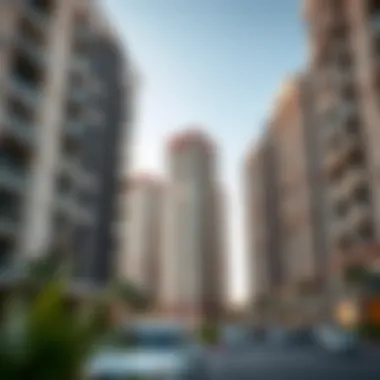The Expat Community in Dubai: Insights and Statistics


Intro
Dubai, often considered the shiny jewel of the Middle East, has gathered a remarkable crowd of expatriates from various corners of the globe. This city, where skyscrapers kiss the clouds and cultures collide, encapsulates a unique blend of tradition and modernity. In recent years, primarily driven by economic prosperity and its enticing lifestyle, the expat community has surged dramatically, making it essential to take a closer look at the numbers and insights behind this phenomenon.
The expat demographic has indelibly shaped Dubai's social and economic landscape. To understand the impact of this diverse society, we will delve into critical market trends, investment strategies, and cultural dynamics that define life in Dubai as an expatriate. Prepare to explore the statistics outlining not just the presence of expats but also their profound contributions to the Emirati economy and society. The landscape is ever-evolving, dictating changes to real estate, consumer behavior, and community engagement in unprecedented ways.
With this exposition, we aim to provide an informed perspective for investors, real estate agents, and anyone keen to grasp the heartbeat of Dubai’s expat community. In doing so, we offer significant insights pertinent to navigating this rapidly changing environment, committed to intellect and foresight over mere trend-following. The forthcoming sections will dissect the current market trends, contemplating future projections, investment opportunities in the most favorable neighborhoods, and strategic advice for those stepping into the vibrant property market of Dubai.
The Expatriate Presence in Dubai
The dynamics of expatriate communities hold significant importance in understanding the broader socio-economic tapestry of Dubai. The city has evolved into a hub that not only attracts countless expatriates for work and lifestyle but also shapes its identity through their contributions. Expats constitute a considerable portion of the city's population, creating diverse neighborhoods, contributing to various sectors, and ultimately influencing local culture.
Understanding the expatriate presence in Dubai allows one to grasp the interplay between local customs and foreign cultures. The benefits derived from this multicultural mix can be immense. For instance, expatriates have significantly boosted industries ranging from technology to hospitality. Additionally, they enrich educational environments with varied perspectives, passing on experiences and practices that can only be gained through diverse backgrounds.
Current Population Statistics
Dubai's expatriate population is a striking figure. As of recent reports, expatriates make up about 89% of Dubai's total population, showcasing a remarkable statistic by any global standard. To put this into perspective, over 3 million people reside in Dubai, with roughly 2.68 million being expatriates. This number reveals how critical the expat population is to the social and economic fabric of Dubai.
The breakdown of these statistics provides fascinating insights:
- South Asians, including Indians and Pakistanis, constitute the largest group.
- Western expatriates, particularly from Europe and North America, form a significant portion as well.
- A smaller but noteworthy segment comes from the Middle East and other regions.
This melting pot not only creates a unique demographic composite but also drives demand for businesses catering to different cultures, from restaurants to retail shops.
Historical Growth Trends
The growth of the expatriate community in Dubai has been nothing short of meteoric. Tracing back to the 1970s, when Dubai started to develop its infrastructure and open up to foreign investment, we see a clear trajectory of increasing expatriate numbers. The oil boom in the late 20th century attracted many workers, leading to fundamental shifts in the city's landscape. Key points in this growth include:
- 1990s: Increase in expatriate jobs due to construction and real-estate developments in anticipation of global events.
- 2000s: Dubai's market diversification began, pulling talents in finance, tourism, and technology.
- 2010s and beyond: Further liberalization of visa regulations and ongoing economic reforms have propelled expatriate attrition rates, boosting overall population numbers.
The trends indicate not just an increase in numbers but a broader acceptance of multiculturalism, with local governmental efforts aimed at integrating diverse communities. Over the decades, policies have evolved to adapt to the needs of expatriates, from residency benefits to labor laws, all catering to create an ecosystem where both expats and locals can thrive together. The story of expatriates in Dubai is intertwined with the narrative of development and growth, emphasizing the importance of understanding these figures not merely as statistics but as contributors to the identity of the city itself.
Demographics of Expatriates
Understanding the demographics of expatriates residing in Dubai offers a window into the vibrant tapestry of cultures and professional insights shaping this cosmopolitan city. Demographic data assists in grasping the nuances of the expat experience, from social integration to community formation. Furthermore, it highlights the economic and cultural contributions expatriates make to Dubai's diverse landscape. Recognizing these demographics is crucial for stakeholders like investors and real estate agents, enabling them to adapt their strategies according to evolving needs and preferences of this dynamic population.
Nationalities Represented
Dubai is often termed a melting pot, showcasing a myriad of nationalities that enrich its socio-cultural fabric. As of recent data, around 85% of Dubai's population comprises expatriates, with significant numbers coming from South Asia, the Middle East, Europe, and North America. Specific statistics indicate that Indians, Pakistanis, and Bangladeshis constitute a large chunk, while Western expatriates continue to contribute significantly to professional sectors.
The presence of over 200 nationalities speaks volumes about Dubai's role as a global hub. This diversity fosters intercultural interactions, which can have valuable implications for business networking and social collaboration. For example, a tech startup in Dubai can easily angle for international talent, leveraging an array of languages and professional expertise. This eclectic mix can lead to innovations across various fields as different approaches blend together.
Age and Gender Distribution
Analyzing age and gender distribution among expatriates reveals insights into community dynamics and needs. Mainly, working-age adults, particularly those aged between 25 and 45, dominate the expat population. This segment is crucial, as they contribute extensively to the labor market, shaping a significant portion of the economy. Expats in this age range are often seeking career advancement and financial stability, factors that drive the influx of individuals to Dubai.
Gender distribution among expatriates tends to reflect broader international trends. While sectors such as hospitality and healthcare have relatively balanced ratios, areas like construction and technical roles may showcase a male-dominated workforce. Understanding these distributions allows policymakers and community leaders to tailor support systems — whether it’s introducing mentorship programs for female professionals or facilitating networking events.


Professional Backgrounds
The professional backgrounds of expatriates in Dubai range widely, and this variety plays a crucial role in the emirate's economic structure. With an ever-growing number of highly-skilled professionals, many expatriates are found in sectors like finance, engineering, hospitality, and technology. Notably, the rise of startups has attracted younger expatriates eager to make their mark in entrepreneurial ventures.
On the other hand, the presence of lower-skilled laborers primarily from South Asia cannot be overlooked. These individuals fulfill essential roles, particularly in construction and maintenance, forming the backbone of the city's rapid infrastructural growth. Recognizing these distinctions between skilled and unskilled labor helps in framing effective labor policies and ensuring appropriate rights and protections for all workers.
The varied professional landscapes of expatriates highlight how interdependence fosters economic growth, driving innovation and competition across sectors.
The demographic details of expatriates play a pivotal role in understanding their social integration, economic contributions, and community formation in Dubai. By dissecting nationalities, age and gender distribution, and professional backgrounds, stakeholders can make informed decisions, ultimately fostering a more harmonious environment that benefits both expats and the local population.
Attraction Factors for Expats
The allure of Dubai, a city basking in the sun and rising to remarkable heights in the global spotlight, is undeniable. It is not just the skyscrapers or the luxury malls that draw people in but a combination of factors that resonate deeply with expatriates. Unpacking these attraction factors reveals much about why individuals from all over the globe plant their flags in this desert oasis. Understanding the nuances behind these pulls helps illuminate the expat experience and its impact on Dubai's ever-evolving landscape.
Economic Opportunities
Economic opportunities in Dubai are like a siren's call for many expats. The city stands as a beacon of financial promise, with its diverse and robust economy. The main sectors where expats find their footing include technology, hospitality, finance, and construction. Attractive salaries, particularly in these fields, often come without the heavy tax burdens found in other countries. This dynamic environment fosters not just employment but also entrepreneurial ventures.
Many expats find themselves taking advantage of the city’s thriving commerce and trade through the numerous free zones. Just think of how companies like Dubai Internet City have attracted tech startups or how Dubai Multi Commodities Centre has become a hub for gold trading. Expats here often feel empowered, tapping into an ecosystem ripe with possibilities that encourage innovation.
Lifestyle and Amenities
It's not just about working hard in Dubai; it’s about living well too. The lifestyle and amenities available are like cherry on top of the cake. The city offers a unique blend of modern living with rich cultural experiences. Dining options span from high-end restaurants serving gourmet experiences to street food markets that bring global flavors together. Shopping is quite a treat, given the array of options, from lavish malls like The Dubai Mall to traditional souks where bargaining is part of the fun.
Moreover, the outdoor life captivates many. Picture weekend brunches under the sun, walks along the Marina, or picnics in one of the many parks. Expatriates can also indulge in various leisure activities, ranging from water sports to desert safaris and cultural exhibitions. When the sun sets, the city transforms into a vibrant nightlife scene, giving expats a taste of both the local and international atmosphere.
Taxation Benefits
One of the most attractive aspects of living in Dubai is its taxation benefits. In contrast to many other countries, Dubai boasts no personal income tax, which means expatriates can keep more of their earnings. This factor is critical for many when deciding to move. Furthermore, several expat-friendly tax treaties with different nations mitigate double taxation issues, making financial planning smoother.
Additionally, some expatriates benefit from corporate tax exemptions, depending on their employment terms. This financial freedom allows for a lifestyle that many only dream about, enabling investments in real estate or education that can enhance their quality of life. Indeed, the supportive fiscal environment in Dubai is integral to its reputation as a desirable expat destination.
In essence, it’s the convergence of economic opportunities, a luxurious yet attainable lifestyle, and significant taxation benefits that makes Dubai stand tall as a favored choice for expatriates from all over the globe. The city not only provides a platform for career advancement but also enriches lives through experience and culture.
Challenges Faced by Expats
When delving into the expat landscape in Dubai, it is crucial to highlight the challenges that this community encounters. Understanding these challenges helps in grasping the full scope of the expatriate experience. It underscores the resilience required to navigate a foreign culture, the complexities of securing adequate housing, and the often-daunting legal processes.
Integration into Local Culture
Integrating into the local culture can be like learning to dance with a partner whose rhythm you don’t quite know yet. Many newcomers to Dubai find themselves swept up in a melting pot of traditions, languages, and social practices. Adapting to a new way of life may often require expats to let go of familiar customs while embracing the UAE's rich heritage.
- Language Barriers: Many expats find that Arabic is the official language, and while English is widely spoken, grasping basic Arabic phrases can facilitate interactions. Learning greetings and simple expressions can create a welcoming atmosphere.
- Social Norms: Familiarizing oneself with local customs is key. For instance, understanding the significance of Ramadan or appropriate attire can enhance social interactions and help in avoiding unintentional offenses.
- Building Relationships: Establishing friendships can be challenging. Expatriates often dock at community groups or social clubs, which can serve as bridges to deeper connections.
Ultimately, integrating into local culture requires more than mere adaptation; it’s about fostering mutual respect and understanding between expats and locals. After all, culture is the soil where relationships bloom.
Housing and Real Estate Concerns
The real estate market in Dubai presents both golden opportunities and hurdles for expats. Finding a place to call home can often feel like navigating a maze without a map. Given that many expats opt for rental accommodations, various factors come into play:


- Rental Costs: Rental prices can fluctuate significantly based on location, size, and amenities. The demand for housing can lead to steep prices, especially in popular districts like Jumeirah or Downtown Dubai.
- Availability of Suitable Housing: With a considerable proportion of the expat population, securing a comfortable and well-located home can become competitive. Sometimes, properties that appear affordable come with hidden costs.
- Contracts and Regulations: The rental process can be cumbersome, with leases often requiring careful scrutiny. Understanding tenant rights and responsibilities is essential and may vary from one property to another.
Navigating the housing landscape in Dubai requires savvy research and, at times, expert guidance from real estate experts. The stakes are high, and making an informed decision can ease the transition into a new life in the city.
Legal and Administrative Issues
The legal framework in the UAE often bewilder even the savviest of newcomers. Understanding the legal parameters is crucial to avoid run-ins with the law that may end up being costly or, worse, detrimental to one's stay in the country. Here are a few common concerns:
- Visa Regulations: Securing a visa can be a lengthy and complex process. Understanding the various types – work, residence, or family sponsorship – is vital for compliance and stability.
- Documentation: Expats frequently must present a wide array of documents, from degree certificates to health insurance. Missing documentation can result in delays or complications during the application processes.
- Local Laws: Each emirate may have different laws and regulations. Familiarizing oneself with local laws, especially concerning issues like alcohol consumption or public behavior is essential to ensuring a smooth living experience.
Facing these challenges head-on requires not only awareness but a proactive approach. When expats engage with the systems in place, they often find themselves flourishing, contributing richly to the social fabric of Dubai.
"Adapting to the Dubai lifestyle means navigating a unique set of challenges, but with the right information and support, expats can truly thrive."
Cultural Dynamics of Expat Life
The cultural dynamics of expatriate life in Dubai is a tapestry woven with threads of diverse nationalities, traditions, and interactions. This aspect is crucial because it goes beyond mere statistics and delves into the lived experiences of those who call Dubai home, even if temporarily. Understanding these cultural exchanges enriches not just the expatriates' lives but also those of the Emiratis and residents alike. It fosters a sense of connection and coexistence among the diverse groups within the city, each contributing their own stories and customs to the vibrant mosaic that defines Dubai today.
Cultural Exchange and Interactions
Cultural exchange in Dubai is vibrant and dynamic. With so many different nationalities represented, you can find a myriad of festivals, culinary delights, and arts from around the world. For instance, the annual Dubai Shopping Festival isn’t just about retail; it’s also a showcase of various cultural performances that highlight the richness of different heritages. From celebrating Chinese New Year with lion dances to the Diwali fairs showcasing Indian traditions, the intermingling of cultures happens on a grand scale.
This interaction often leads to mutual understanding. Expatriates have the opportunity to engage with local customs and practices, gaining insights that help build interpersonal bridges. On the flip side, many Emiratis also benefit from this cultural influx, as they are exposed to new ideas and perspectives that can influence their own practices. The local cafes are often filled with conversations mixing English, Arabic, Tagalog, and Hindi, reflecting the melting pot that Dubai truly is.
Expat Communities and Associations
The formation of expat communities and associations in Dubai plays a pivotal role in making the city welcoming for newcomers. These communities often emerge based on nationality, profession, or shared interests. For example, groups such as the South African expatriates’ association or the Indian Business & Professional Council provide a vital support network. They typically organize events, cultural celebrations, and even assist newcomers in navigating the complexities of living in a foreign land.
Engaging in these associations allows expatriates to not only retain a connection to their roots but also helps them to integrate better into the local society. It creates a sense of belonging during what can often be a challenging transition. The presence of recreational clubs, networking groups, and cultural events fosters friendships and collaborations.
Economic Impact of Expatriates
The expat community in Dubai greatly influences the economic landscape of the city. It not only shapes the cultural richness of the environment but also significantly contributes to the economy by driving various sectors. Understanding this impact offers valuable insights into the evolving dynamics of the market. Here are a few elements to consider regarding the economic contributions made by expatriates:
- Labor Market Dynamics
- Real Estate Market Fluctuations
- Changes in Consumer Behavior
Each of these factors highlights how expatriates are essential to the ongoing economic conversation in Dubai. Let's flesh out these points in detail.
Contribution to the Labor Market
Expats are the backbone of Dubai's labor market. They occupy vital roles in various sectors, including technology, finance, healthcare, and hospitality. The sheer diversity of skills available through expatriates allows companies to fill positions that local talent might not cover. Furthermore, sectors such as construction and tourism often rely heavily on foreign workers.
While some locals hold positions of authority or specialization, it’s generally the expatriate workforce that drives operational processes. This setup often leads to a competition for talent, resulting in potentially higher wages, which in turn can stimulate the economy. The mix of cultural perspectives also can foster innovation and creativity, pushing companies to expand their services and products.
This blend of cultures and skills is what makes organizations in Dubai uniquely competitive on a global level.
Influence on Real Estate Prices


Expatriates have a marked impact on Dubai's real estate market. Many come with a certain level of disposable income and look to secure quality housing, whether for rent or purchase. This demand can cause an uptick in property prices, especially in popular districts. Not only does this raise the stakes for homeowners, but it also affects developers and investors who must remain attuned to the fluctuations in demand.
Specifically, the need for housing zones catering to expatriate desires — amenities like pools, gyms, and proximity to schools — has prompted luxury developments. Moreover, real estate agents in Dubai tap into this demographic to offer tailor-made housing solutions, thus underscoring the importance of understanding expatriate preferences. The rental market also thrives on the forward momentum created by a steady influx of new residents.
Consumer Trends and Preferences
When it comes to consumer behavior, expatriates tend to exhibit different spending habits than the local population. They often seek international brands and products that remind them of home, leading to an increased demand for diverse goods and services. This tendency creates opportunities for businesses to cater to a broader range of consumers, subsequently influencing market trends.
Factors such as cuisine, retail choices, and leisure activities substantially shift with a growing expat presence. For example, restaurants offering international cuisine see marked interest, and grocery stores that provide a variety of imported goods flourish. Additionally, local businesses may modify their inventories and services to meet expats' needs, thus contributing to an adaptable and responsive market environment.
In sum, the economic impact of expatriates in Dubai extends from employment challenges to housing market dynamics and consumer behavior shifts. Understanding these factors provides a clearer picture of how integral expatriates are in shaping the emirate's economy.
Future Projections for the Expat Community
Understanding the future of the expat community in Dubai is crucial not only for the expatriates themselves but also for investors, business owners, and policymakers. The dynamics of the global economy are ever-changing, and Dubai is no exception. Therefore, analyzing projected trends in this vibrant expat scene helps stakeholders anticipate opportunities and challenges ahead. Factors like government initiatives, urban strategies, and socio-economic shifts all intertwine, shaping the landscape of expat life in the coming years.
Government Policies and Their Implications
Government policies play a pivotal role in shaping the trajectory of the expat community in Dubai. The UAE government has routinely established regulations aimed at fostering a hospitable environment for expatriates. Through various initiatives, they target areas such as visa regulations, employment laws, and healthcare accessibility.
Recent steps taken include the introduction of the Golden Visa program, which offers long-term residency to investors, entrepreneurs, and talented individuals. This program encourages expats to settle down and invest more into their ventures, enhancing their contribution to the local economy. Furthermore, the government’s strong push towards diversifying the economy beyond oil means a spotlight on sectors like technology, renewable energy, and tourism. These sectors tend to attract a specifically skilled expatriate workforce.
"The ongoing policy adjustments indicate a commitment to creating a sustainable and thriving community for expatriates, reflecting an understanding of their essential contribution."
Moreover, the responsiveness of local policies to international standards can significantly enhance Dubai’s appeal. For instance, adherence to labor rights and improvement in the legal frameworks surrounding work can boost investor confidence, making Dubai an attractive hub for high-caliber talent.
Urban Development and Housing Trends
The landscape of urban development in Dubai is reflective of its ambitions to become a global city, full of opportunities and luxury. Various mega-projects are underway, reshaping residential and commercial districts alike. For expats, these changes present not only modern living spaces but also integrated communities where lifestyle meets convenience.
A prominent trend is the growth of freehold areas where expatriates can own property. Neighborhoods such as Dubai Marina, Downtown Dubai, and Jumeirah Lake Towers provide not just accommodation but an experience, blending cultural exchanges and diversity. The demand for such properties continues to surge among expatriates, indicating an inclination towards long-term residency.
On the flip side, current shifts in demographic patterns imply a need for affordable housing. Expats looking for budget-friendly options are driving new developments in suburban locations. The balance between traditional luxury and contemporary affordability will contribute to the housing narrative in Dubai.
In summary, as Dubai continues to advance urbanly and economically, the future of the expat community seems to hinge on thoughtful government policies alongside strategic urban development. Keeping an eye on these developments will be essential for all stakeholders involved in Dubai’s ever-changing landscape.
Culmination
Understanding the expatriate community in Dubai is no small feat; it's a vibrant tapestry woven with diverse threads of culture, aspiration, and economic potential. Over the course of this article, we've peeled back the layers to uncover not just numbers but the real essence of expat life in this bustling metropolis. The key takeaway here is that expatriates are not merely residents; they are integral to Dubai's identity and economic landscape.
Recap of Expatriate Influence
The impact of expatriates on Dubai is multifaceted. From contributing to the labor market across various sectors to fueling consumer demand, their presence drives significant growth. For instance:
- Labor Market Contributions: Expats fill roles from top executives to skilled tradespeople, influencing the local job market and business ecosystem.
- Real Estate Dynamics: Their demand for housing escalates property prices, directly shaping Dubai's real estate landscape. This in turn affects investors’ strategies and urban planning.
- Cultural Enrichment: Through cultural exchanges and community events, expatriates enrich the social fabric of Dubai, fostering a world where various traditions coexist.
As a result, acknowledging the expatriate influence is crucial for anyone looking to navigate or invest in the Dubai market. The numbers you see reflect more than just demographics; they tell stories of ambition, growth, and the complexities of living abroad.
The Path Forward for Expatriates
Looking forward, the future for expatriates in Dubai appears bright yet requires adaptation and resilience. Government policies focusing on sustainability and urban development are likely to shape the expat experience moving forward.
- Policies and Support: Future regulations could ease legal complexities, making it simpler for newcomers to acclimatize.
- Community Initiatives: Expats are encouraged to engage with local initiatives and create community bonds, which can ease the integration process.
- Real Estate Trends: Investors should keep an eye on evolving housing trends as expat preferences shift, potentially opening doors for new investment opportunities.
In essence, for expatriates, navigating this environment will require an understanding of both opportunities and challenges. As Dubai continues on this path of growth and diversification, so too do the experiences and contributions of its expatriate community.











